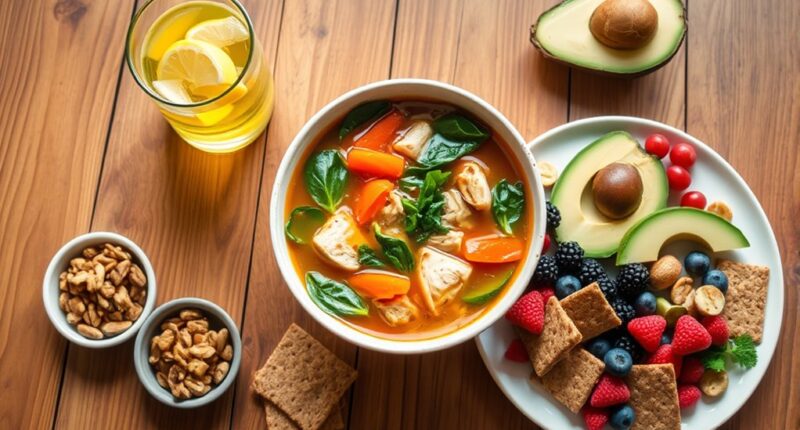To help your body heal after childbirth, focus on iron-rich foods like lean meats, spinach, and beans, combined with vitamin C sources such as citrus and peppers to boost iron absorption. Include healthy fats like avocados and oily fish for brain health and mood. Stay well-hydrated with water and herbal teas to support breastfeeding. Incorporate fruits, vegetables, and fiber to aid digestion, and eat enough protein from eggs, dairy, and lean meats to repair tissues. Continue exploring for more tips to optimize your recovery.
Key Takeaways
- Consume iron-rich foods like lean meats, spinach, and beans, paired with vitamin C sources to replenish blood and prevent anemia.
- Include healthy fats such as avocados, nuts, and oily fish to support brain health and hormone production.
- Stay well-hydrated with water, herbal teas, and broths to promote milk production and overall recovery.
- Eat plenty of fruits, vegetables, and fiber-rich foods to boost nutrients, aid digestion, and prevent constipation.
- Incorporate adequate protein sources like eggs, dairy, and lentils to support tissue repair, muscle maintenance, and energy levels.

After giving birth, your body needs proper nutrition to recover, support breastfeeding, and regain energy. Focusing on the right foods can make a significant difference in how quickly and comfortably you heal. When considering postpartum meal planning, it’s essential to include nutrient-dense options that replenish your stores and boost your overall well-being. Breastfeeding essentials, such as iron-rich foods, healthy fats, and plenty of fluids, should be integrated into your daily diet to ensure both you and your baby thrive.
Start by prioritizing foods that are rich in iron, like lean meats, spinach, and beans. Iron helps replenish blood lost during childbirth and prevents anemia, which can cause fatigue. Pair these with vitamin C-rich foods such as citrus fruits or bell peppers to enhance iron absorption. Incorporate healthy fats from sources like avocados, nuts, and oily fish, which support brain health, hormone production, and milk quality. Consuming omega-3 fatty acids from fish like salmon can also help reduce postpartum depression symptoms, making them an indispensable part of postpartum meal planning.
Hydration is essential for breastfeeding moms, so drink plenty of water throughout the day. Herbal teas and broths can also keep you well-hydrated and provide additional nutrients. To optimize your recovery, include plenty of fruits and vegetables, which supply essential vitamins, minerals, and fiber. Fiber-rich foods like whole grains, oats, and vegetables can help combat constipation, a common postpartum issue. Additionally, incorporating probiotic-rich foods such as yogurt and kefir supports gut health, boosting your immune system and aiding digestion. Monitoring your nutritional intake can ensure you meet your specific postpartum needs effectively.
Protein is another cornerstone of postpartum nutrition, helping repair tissues and maintain muscle mass. Good sources include eggs, dairy, lean poultry, and plant-based options like lentils and quinoa. These foods provide sustained energy, which you’ll need as you navigate caring for your newborn and managing fatigue. Also, consider adding postpartum supplements if recommended by your healthcare provider, especially for nutrients like vitamin D and omega-3s, which support your recovery and milk production.
Frequently Asked Questions
How Can I Improve My Energy Levels Postpartum?
To boost your energy postpartum, focus on improving your sleep strategies and engaging in gentle postpartum fitness routines. Prioritize rest whenever possible, even if it means napping during the day. Stay active with light exercises to increase your stamina and mood. Proper nutrition, including iron-rich foods, also plays a vital role in maintaining energy levels. Remember, taking care of yourself helps you recover faster and feel more energized to care for your little one.
Are There Specific Foods to Boost Milk Production?
You can boost your milk production by incorporating specific foods into your diet. Herbal teas like fenugreek or blessed thistle support lactation, while lactation smoothies with oats, flaxseed, and brewer’s yeast provide essential nutrients. Stay well-hydrated, and consider adding these foods regularly. Combining herbal teas and nourishing smoothies helps naturally increase your milk supply, making breastfeeding easier and more comfortable for both you and your baby.
What Nutrients Are Essential for Postpartum Hair Recovery?
Ever wonder what supports postpartum hair recovery? Essential nutrients like biotin, iron, zinc, and vitamins A, C, and E play a crucial role. They help strengthen your hair follicles and promote new growth. Focus on nutrient-rich foods like eggs, nuts, leafy greens, and fish. Staying well-nourished guarantees your body can recover, and your hair regrows healthy and strong. Are you giving your body the nutrients it needs for ideal postpartum recovery?
How Can I Manage Postpartum Digestive Issues Through Diet?
To manage postpartum digestive issues through diet, focus on incorporating probiotic foods like yogurt and kefir to restore healthy gut bacteria. Also, choose fiber-rich snacks such as fruits, vegetables, and whole grains to promote regular digestion and prevent constipation. Stay hydrated and eat small, frequent meals to ease digestion. These strategies support your digestive health, helping you feel more comfortable and energized during postpartum recovery.
Are There Foods to Help Reduce Postpartum Mood Swings?
You can help reduce postpartum mood swings by incorporating nutrient-rich snacks like nuts, seeds, and fresh fruit into your diet. Herbal teas such as chamomile or lemon balm may also promote relaxation and emotional balance. Focus on eating balanced meals with plenty of omega-3 fatty acids and vitamins, which support brain health. These small changes can make a significant difference in stabilizing your mood during this challenging time.
Conclusion
Taking care of your body after childbirth is essential, and the right foods can make a big difference. Incorporate nutrient-rich options like leafy greens, lean proteins, and whole grains to support healing and energy. Did you know that breastfeeding moms need about 500 extra calories daily? Prioritize your nutrition, and you’ll help your body recover faster while providing the best care for your little one. Remember, nourishing yourself is key to thriving postpartum.









